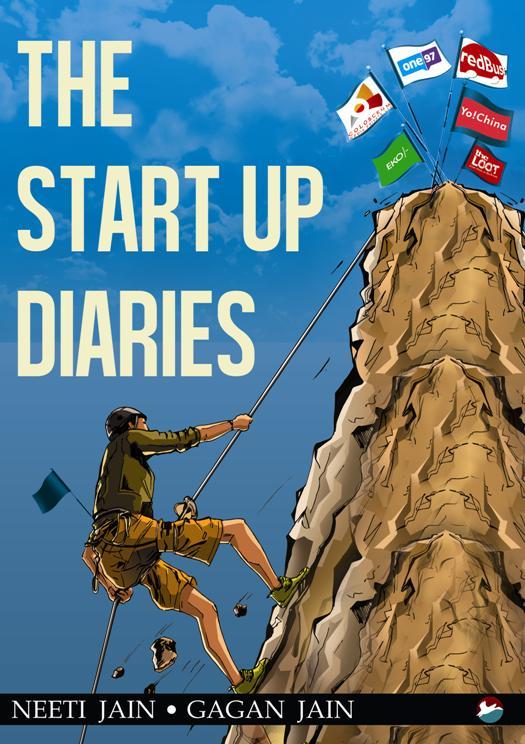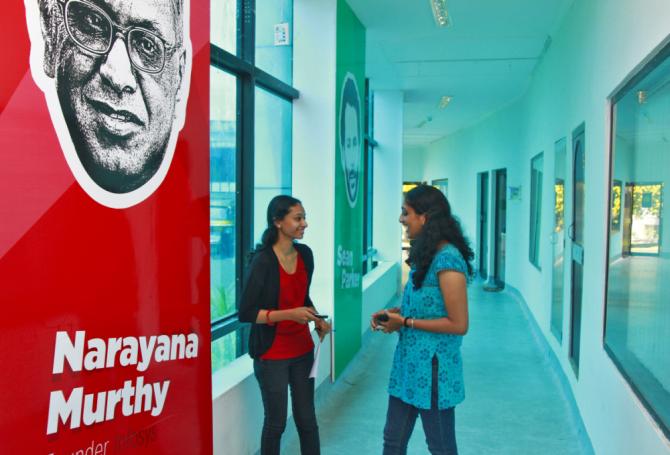 | « Back to article | Print this article |
'99% of decisions start-ups take is not because of vision'
Author of The Start Up Diaries, Gagan Jain, discusses how he wrote a book on entrepreneurs, in English, despite his vernacular background
I think the biggest humiliations of your life should act as your biggest encouragement,” says freshly minted author Gagan Jain.
He should know. He says he was “humiliated left, right and centre in front of 60 students” because he couldn’t speak English properly.
This was when he enrolled for CAT classes in Indore after completing school and college in the Hindi medium from Manawar, a small town in Madhya Pradesh’s Dhar district.
The teacher told him to go up on stage and say a few sentences in English. Gagan fumbled.
“If somebody humiliates you on the first day of the class and despite that you have the courage to attend the class the second day, you are a winner,” says Gagan.
The next day Gagan surprised his tormentor.
“I mugged up an editorial from the Times of India. When my turn came the next day to speak from the dais, I just rattled off the editorial. I don’t know what I said.”
Nine years after that incident, Gagan and his wife Neeti successfully published The Start Up Diaries, a book in English that chronicles the journeys of six Indian entrepreneurs, some successful, some still struggling.
Within 45 days of the launch this September, the book had sold 1,400 copies.
Idea behind The Start Up Diaries
After completing his Master’s in marketing management from the Times School of Marketing in Delhi, Gagan worked with a mobile couponing firm (which has today made it big in e-commerce), before moving to Muscat to head a fashion apparel brand.
There, he read how this venture had metamorphosed into a big company and suggested to his brother that he start an e-commerce venture.
“He refused, saying such a start-up required a vision for success. He said we were not capable of doing e-commerce or a start-up,” says Gagan.
This reaction from his brother set him thinking.
He realised there were two reasons for his brother’s reaction, and by extension, all those who shun entrepreneurship.
One was lack of information and the second was excess information.
“Lack of information in the sense that most of the traders -- who in a way are also entrepreneurs because they run their own businesses -- don’t know the existence of The Indus Entrepreneurs (a non-profit trade group dedicated to fostering entrepreneurship) and mentoring by experts, or of the ecosystem that supports start-ups today,” Gagan elaborates.
He explains “excessive information” as being the perception gleaned from books about entrepreneurship that glorify an entrepreneur as a superman.
“Every such book says that entrepreneurs are visionaries, they know how their business will shape up five to ten years down the line, they come from the best b-schools with strong networks, etc.”
This is not actually the case. Gagan says he doesn’t feel that most start-ups when they start a business have a vision.
“Ninety-nine per cent of decisions start-ups take are not because of vision. They have to be taken because you can’t do anything else,” he emphasises.
“My idea (in writing the book) was to present a very realistic and pragmatic picture so that every person who reads it feels that start-ups are not about supernatural powers. It is about anybody who would like to start a business. That’s how the idea came to write this book.”
So, what’s different?
Gagan says his book is different from others of the kind.
The Start Up Diaries is not a manual or a preaching text. “The book doesn’t tell you to do these ten things and you will become a successful entrepreneur. My book talks about reality as it exists on the ground.”
The stories of the six entrepreneurs covered in his book are told in a narrative format. Most other books on entrepreneurship are either done in interview format or are essays, he says. In such books the essence of an entrepreneur’s story is lost, he argues.
“We have shown how entrepreneurs who are successful today have made a lot of mistakes. We have also covered a company which is struggling big time.”
“The Start Up Diaries is not only about the success of entrepreneurs but also talks about their struggles and stupid mistakes.”
'I knew that this book could not be a Booker prize winner'
Who made the cut and how
- Vijay Shekhar Sharma: Founder One97
- Abhinav and Abhishek Singa: Founders, Eko
- Ajit Andhare: Founder, Colosceum Media
- Phanindra Sama, Charan Padmaraju and Sudhakar Pasupunuri: Founders, redBus
- Jay Gupta: Founder, The Loot
- Ashish Dev Kapur: Founder, Yo! China
When he was in Muscat, Gagan started short-listing start-ups in India that were making news. His first list had 55 companies and he contacted them all.
Ten responded and eight gave the writer couple time for interviews. Six were candid enough to tell the real story, mistakes and all. And they are featured in the book.
The filtering process also included going with those companies that responded to someone like him who had no scholarly background.
“When we approached these companies we were not supported by a big publishing house. So, people who were very grounded gave us chance to speak with them.”
Convincing the subjects
Gagan was clear he was not writing a literary work. “I knew my limitations. I knew that this book could not be a Booker prize winner,” he jokes.
The book was like a start-up venture for him. He knew he had a book and had to take it to its logical conclusion, make it successful like any other project or start-up.
He told the entrepreneurs that the book would be different in terms of content. He was treating it as a start-up venture and needed their support.
“A lot of the companies we selected were new guys and that was also one of the reasons we selected these companies. Most of these guys were successful after a lot of struggles. So they were able to connect with us.”
'Entrepreneurs who are building India now are very open to accept that they committed certain mistakes'
The Special Six
What impressed him most about the six chosen entrepreneurs was their humblenessand openness.
“The best part -- which is also good for the country -- is that all these entrepreneurs who are building India now are very open to accept that they committed certain mistakes.
“They were ready to speak about them openly and have the enthusiasm to guide their juniors on the path of entrepreneurship.
“’I was stupid to make that mistake’. For a CEO to say this in a book is a brave thing,” he says.
The learnings
In the process of writing this book Gagan learned a lot of things: how to network, how to connect with people, how to approach them, how to get a ‘yes’ from them, also how to say ‘no’.
About the last learning Gagan narrates an interesting story. They had chosen eight companies but only six stories were published because the two that were left out were trying to derive mileage out of the authors’ efforts, Gangan said.
“One of the stories went through nine drafts and eventually had to be dropped because the person in question was using it as a tool to market himself,” says Gagan.
This company today has a turnover of Rs 400 crore. It had to be rejected because it did not fit the final vision of the authors.
What Gagan always knew -- and which was reinforced during the writing of this book -- was that “we all need to take the first step and if you believe in yourself then there is the Pygmalion effect at work,” he says.
“If you believe in yourself and have the conviction then the world can offer extreme levels of possibilities. Now, the book is published and it is doing well in the market, and this from a guy who comes from a small town, with no idea of English.”
One of his subjects, Vijay Shankar Sharma, echoes this experience.
“In 2008 he was struggling to pay rent to his landlord. In 2012 he created a 100 million dollar fund to support start-ups.
“This tells us about the possibilities we can experience if we have conviction to take that first step.”
Advice to young entrepreneurs
Young entrepreneurs as well as people who want to do something different always hear this one line from people around them: Hawaa main mat ud, nahi toh ek din gir jayega (don’t fly too high; you will come crashing down one day).
“Of course, if you try to fly, you may fall down. It is very realistic and everybody should keep that in mind.
“But the solution is not to run away from pursuing your dreams. What we must tell young entrepreneurs is there is a possibility of falling down but it is okay to fall down. You don’t need to be critical about it.
“Get up and move on,” says the man who has done just that.


